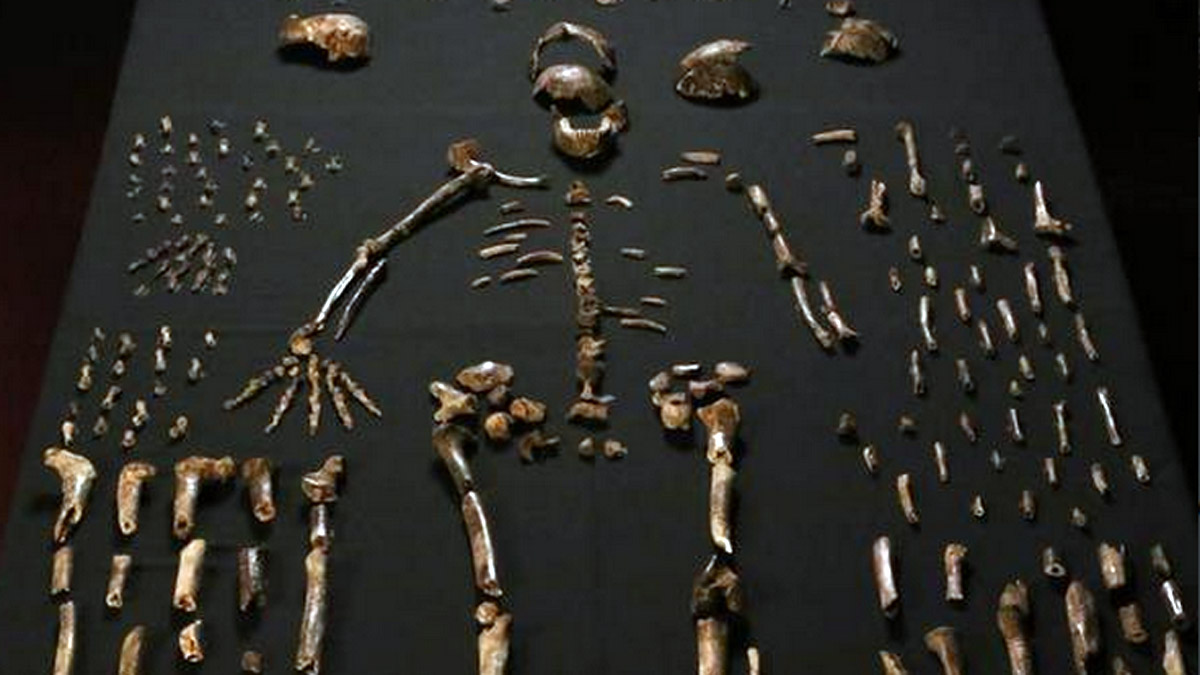New species of ancient human found in cave, claim scientists
'Homo Naledi' was very skinny with powerful joint muscles and the brain the size of a gorilla's

A free daily email with the biggest news stories of the day – and the best features from TheWeek.com
You are now subscribed
Your newsletter sign-up was successful
Scientists in South Africa claim to have found the fossils of a previously unknown ancient human-like species lying in a cave.
The creature may have lived up to three million years ago and been an early member of the evolutionary group that includes today's humans, say researchers.
More than 1,550 fossils were found in the Cradle of Humankind, a World Heritage Site about 50km north-west of Johannesburg. They come from at least 15 individuals, which show a mix of human and primitive characteristics. However, it is difficult to confirm the age of the creature, which has been named Homo naledi.
The Week
Escape your echo chamber. Get the facts behind the news, plus analysis from multiple perspectives.

Sign up for The Week's Free Newsletters
From our morning news briefing to a weekly Good News Newsletter, get the best of The Week delivered directly to your inbox.
From our morning news briefing to a weekly Good News Newsletter, get the best of The Week delivered directly to your inbox.
"What we have is a tall hominid, between 1.45 and 1.5 metres tall, was very skinny, had powerful joint muscles and had a brain about the size of my fist," said Professor Lee Berger, of South Africa's Wits University, who led the team.
According to the findings, reported in two papers published in the online journal eLife, the brain is small, like a gorilla's, but the hands are more modern and suited to making basic tools. The feet and ankles are built for walking upright, but the fingers are curved.
Other experts have pointed out the resemblance of the bones to those of early Homo erectus, a primitive species named in the 1800s, says The Guardian.
Tim White, a paleoanthropologist at the University of California, Berkeley, suggests the "unique" features displayed by the new fossils could just represent individual variation or variation at the population level of Homo erectus.
A free daily email with the biggest news stories of the day – and the best features from TheWeek.com
William Jungers, an anthropologist at Stony Brook School of Medicine in New York, told the Guardian: "If they are as old as two million years, then they might be early South African versions of Homo erectus, a species already known from that region. If much more recent, they could be a relic species that persisted in isolation. In other words, they are more curiosities than game-changers for now."
-
 The Olympic timekeepers keeping the Games on track
The Olympic timekeepers keeping the Games on trackUnder the Radar Swiss watchmaking giant Omega has been at the finish line of every Olympic Games for nearly 100 years
-
 Will increasing tensions with Iran boil over into war?
Will increasing tensions with Iran boil over into war?Today’s Big Question President Donald Trump has recently been threatening the country
-
 Corruption: The spy sheikh and the president
Corruption: The spy sheikh and the presidentFeature Trump is at the center of another scandal
-
 Potential poisoning and succession posturing for South Africa’s Zulu king
Potential poisoning and succession posturing for South Africa’s Zulu kingfeature Conflicting reports over king’s health highlight ongoing bitter power struggles
-
 Embattled South African president will not resign, says it is up to political party to decide fate
Embattled South African president will not resign, says it is up to political party to decide fateSpeed Read
-
 The Week Unwrapped: Africa alert, ticket touts and the words of the year
The Week Unwrapped: Africa alert, ticket touts and the words of the yearpodcast Is South Africa at risk of terrorist attacks? Why are ticket touts in such high demand? And are we really in a ‘permacrisis’?
-
 Home Office worker accused of spiking mistress’s drink with abortion drug
Home Office worker accused of spiking mistress’s drink with abortion drugSpeed Read Darren Burke had failed to convince his girlfriend to terminate pregnancy
-
 In hock to Moscow: exploring Germany’s woeful energy policy
In hock to Moscow: exploring Germany’s woeful energy policySpeed Read Don’t expect Berlin to wean itself off Russian gas any time soon
-
 Were Covid restrictions dropped too soon?
Were Covid restrictions dropped too soon?Speed Read ‘Living with Covid’ is already proving problematic – just look at the travel chaos this week
-
 Inclusive Britain: a new strategy for tackling racism in the UK
Inclusive Britain: a new strategy for tackling racism in the UKSpeed Read Government has revealed action plan setting out 74 steps that ministers will take
-
 Sandy Hook families vs. Remington: a small victory over the gunmakers
Sandy Hook families vs. Remington: a small victory over the gunmakersSpeed Read Last week the families settled a lawsuit for $73m against the manufacturer